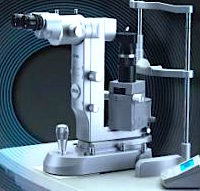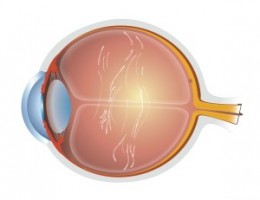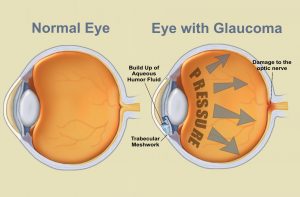by Dr. M | Dec 21, 2017 | Exam, Floaters, Laser, Mark Moran, Patient Care
If floaters are getting in the way of your vision, there is a solution.

Laser treatment can clear floaters from your vision.
Laser Treatment for Floaters is now available at Moran Eye Associates. This painless, in-office procedure, can remove and reduce floaters from your vision. It is covered by most medical insurances.
The goal of this treatment, known as Vitreolysis, is to achieve a functional improvement so that you can return to day-to-day activities without the hindrance of floaters.
What happens during the procedure?
In an exam room using the YAG Laser pictured above, Dr. Moran will apply laser light to evaporate the floaters. The laser pulses convert the floater molecules into a gas, removing or reducing the floater so that it no longer disturbs your vision.
Before the procedure, your eye will be numbed with anesthetic drops. Then, a contact lens will be placed on your eye so that Dr. Moran can clearly see inside your eye while looking through a special microscope.
During treatment, you may notice small, dark specks or shadows. The laser will make a clicking sound as the pulses of light are applied. Each treatment session will take about 20-30 minutes, and it may take two, or possibly three sessions, in order to achieve the best result.
Are you a candidate for Laser Floater Treatment?

Dilated Eye
Before you schedule the laser procedure, Dr. Moran will need to see you for a dilated evaluation to determine your eligibility for vitreolysis treatment.
Considerations include your age, how long you have had the floaters, and the characteristics of the floaters themselves.
Are there different types of Floaters?
Yes. Floaters are the small pieces of debris that float in the vitreous (clear fluid) of the eye. Floaters can appear long and stringy, cloud-like or round.

Cobweb Floaters
Fibrous Strand Floater: Most common in young people, this thin, dense floater can appear as dots, or stringy cobwebs, which are a result of clumping of the collagen in the eye. Depending on the size and location of this floater, it may be treatable with vitreolysis.

Cloud-Like Floaters
Diffuse Floaters: This cloud-like type of floater is caused by the natural aging of the eye. Due to the scattered, wide-spread nature of this floater, it may require multiple treatments for best results.

Weiss Ring Floater

Weiss Ring Floater: This large, ring-shaped floater is located safely away from the lens and the retina, which makes it a good candidate for this procedure.
If you have more questions about this procedure, set up an appointment for an evaluation to see if we can make your vision floater-free 610-628-2022.
by Dr. M | Dec 11, 2017 | Appointment, Cataracts, Exam, Patient Care

Live life to the fullest!
The Journal of the American Medical Association (JAMA), ophthalmology division has recently reported that women who had cataract surgery lived longer and had a lower incidence of other diseases.
In October of 2017, the JAMA article revealed the results of a large study of over 70,000 women participating in the Women’s Health Initiative. The Women’s Health Initiative is an observational study of data collected for over 2 decades. It found that over half of the participants followed in the study had cataract surgery. The most common age for the surgery was 70 1/2 years old.
It also found that women who did have cataract surgery had a lower risk of dying – due to any cause – than those who didn’t have cataract surgery. The study was not designed to determine the reason for the lower risks of vascular, accidental, neurologic, or infectious conditions. What it did suggest is cataract surgery improved a patient’s overall function keeping them healthier.
One caution: Cataract surgery for just the sake of having cataract surgery did not indicate an improvement. It is beneficial only if your doctor determined it was necessary for the improvement of your sight.
If you notice that your vision is not as clear as it once was, don’t delay, schedule a cataract evaluation with Dr. Moran.
For more information about cataracts and cataract surgery click on the following link, Understanding Cataracts
by Dr. M | Nov 24, 2017 | Appointment, Exam, Glaucoma, Medical Eye Care, Patient Care
Glaucoma is known as the “Silent Thief of Sight” because it can begin to rob you of your sight before you notice any symptoms.

Regular exams are essential!
Regular eye exams are your best defense against the early detection and treatment of glaucoma. At each visit, we will check your eye pressure, and Dr. Moran will look at the back of your eye to examine the health of the optic nerve. These important tests can detect the start of glaucoma, and get you started on a simple treatment therapy that can save your sight.
Know if you are at risk.
According to the Glaucoma Research Foundation, people in these categories are at higher risk for developing glaucoma.
Age 60 or Older: Glaucoma is much more common among older people. You are six times more likely to get glaucoma if you are over 60 years old.
Family History: The most common type of glaucoma, primary open-angle glaucoma, is hereditary. If members of your immediate family have glaucoma, you are four to nine times higher to develop this disease.
African Descent: Glaucoma is six to eight times more common in African-Americans than in Caucasians.
Hispanics in Older Age Groups: Recent studies indicate that the risk for Hispanic populations is greater than those of predominantly European ancestry, and that the risk increases among Hispanics over age 60sisipisi.ccsisipisi.ccsisipisi.ccsisipisi.cc.
Asian Descent: People of Japanese descent are at higher risk for glaucoma.
You may NOT notice a change in your vision until irreversible damage is done.

Eye with glaucoma
Many people who are in the early stages of glaucoma are unaware of their condition. When vision loss becomes noticeable, glaucoma may have caused irreversible damage.
If left untreated, glaucoma will lead to blindness. Although there is no cure, medications and surgery can help slow the disease’s progression. Vision loss occurs because increased eye pressure from glaucoma can damage the optic nerve, which carries images from the eye to the brain.
Don’t delay. Early detection and treatment is the best way to manage your condition. Dr. Moran may prescribe eye drops, which, when used daily, may be all that you need to keep your eyes healthy. If prescription eye drops are not sufficient to control your glaucoma, laser treatment or surgery may be an option.
Monitoring your progress: In addition to an eye exam, Dr. Moran may request additional tests. Glaucoma patients are monitored using annual visual field and OCT tests. Changes in your test results may indicate a need for an update in your treatment plan.
To learn more about this disease, visit the Glaucoma Research Foundation GRF.
by Dr. M | Oct 30, 2017 | Appointment, Dilation, Exam, Medical Eye Care, Patient Care, Retina, Uncategorized
DROPS, DROPS, when does it stop?

Ocular medication for dilating and glaucoma, assorted types
Patients often ask when they come in to see Dr. Moran for a complete exam, diabetic exam or cataract recheck, “Why all these drops?” Here is the simple explanation.

The eye doctor is easier than the dentist!
Getting a comprehensive eye exam without dilation, is like going to the dentist and not opening your mouth. Sure, he can see your lips and the shape of your jaw but he’s unable to see the health of your teeth.
Dr. Moran can examine the lids, lashes, and cornea (outermost layer of your eye), but to see beyond the surface, you need the drops, drops and more drops.
Depending on your age, diagnosis and health history you may receive more drops than another. Let’s discuss someone in their 60’s with diabetes or cataracts.
First, you will receive the “yellow drop”- No your eyes will not stay that color. This drop will allow us to check the intraocular pressure of your eye (glaucoma screen). It also acts as a mild numbing agent.
Next, you will receive a Phenylephrine drop. This is the drop which will dilate your pupil and allow Dr. Moran to see into the depths of the eye and examine the retina.
Lastly, comes the Mydriatic drop which paralyzes the iris muscle to keep the eye dilated for the duration of the examination.
That’s the answer to why all the drops. Now when will it STOP?
Usually, dilation lasts from 4-6 hours. It will affect your ability to work close-up and you will be sensitive to light. Blue eyes tend to stay dilated longer. It is not unusual for some patients to remain dilated for more than 6 hours, but dilation is not harmful to the eye.

You can drive if you are comfortable doing so. We recommend dark sunglasses and will provide you with them if you forget to bring yours.
Although being dilated can be an inconvenience, the benefit significantly outweighs the hassle.
Schedule your DILATED eye examination by calling or texting our office at 610-628-2022, we look forward to seeing you.
Contributed by Mandy Bolton, COA
by Dr. M | Oct 24, 2017 | Education, Experience, Mark Moran, Patient Care
 Mark E. Moran, D.O., M.S.H.I., F.A.O.C.O
Mark E. Moran, D.O., M.S.H.I., F.A.O.C.O
Dr. Mark Moran has added another degree to his already impressive set of academic accomplishments. He recently completed a Master of Science in Health Informatics (MSHI) at Drexel University. We are very proud of our graduate!
This area of study provides knowledge of how to use information technology efficiently and responsibly to improve health outcomes.
Dr. Moran explains why pursuing this degree was important to him.
“I’ve always had a dual career in both medicine and computers. I pursued my medical degree to allow me to practice medicine. At the same time, I continued my computer career without an official degree. The online Drexel program allowed me to formalize that computer experience, without taking time away from seeing my patients. With the integration of computers and informatics in medicine today, the two career paths have merged into one.”
As a practicing physician, Dr. Moran brought a unique first-hand perspective to his course of study. He was able to apply his knowledge directly to his practice, Moran Eye Associates, in Bethlehem, PA. Now, his patients benefit not only from his medical experience, but also from his awareness of how healthcare information can be managed and shared for better patient care.
This newly accredited Drexel program was developed with the following mission statement:
The mission of the MSHI program is to advance national healthcare goals by preparing health informatics professionals to exercise leadership in an increasingly patient-centered and data-driven environment.

Dr. Moran is a Drexel University Graduate
The program pursues this mission by offering an interdisciplinary, broad-based curriculum that encourages engagement with industry and fosters both research-based and experiential learning.
For more information on this degree program, click to visit the Drexel University website: Drexel University MSHI
by Dr. M | Sep 13, 2017 | Education, Exam, Experience, Office, Patient Care
We congratulate Mandy Bolton on achieving her Certified Ophthalmic Assistant (COA) designation!

Mandy

The COA professional certification is provided by (JCAPHO), the Joint Commission for Allied Health Personnel in Ophthalmology and is an industry-recognized achievement.
Mandy’s COA accomplishment is not her first professional achievement. She was also the first Certified Patient Services Specialist in the state of Pennsylvania, completing that program in 2013. Her educational achievements highlight her dedication to providing the best patient care.
What is a COA?
The Certified Ophthalmic Assistant (COA) is a core designation for eye care professionals on the path to success. This designation confirms an assistant’s knowledge in 19 specific content areas. The COA certification examination is three hours in length and is comprised of 200 scored multiple-choice questions.

Many hours of textbook study goes into preparation for this demanding test. Mandy was also fortunate to have hands-on experience working with patients and learning from Dr. Moran to help supplement her course of study. Dr. Moran is proud of her dedication to our practice and to our patients.
When you see Mandy, please be sure to congratulate her on her achievement!














 Mark E. Moran, D.O., M.S.H.I., F.A.O.C.O
Mark E. Moran, D.O., M.S.H.I., F.A.O.C.O


